4th August 2016 Khartoum
Reflections of a British media trainer in Sudan
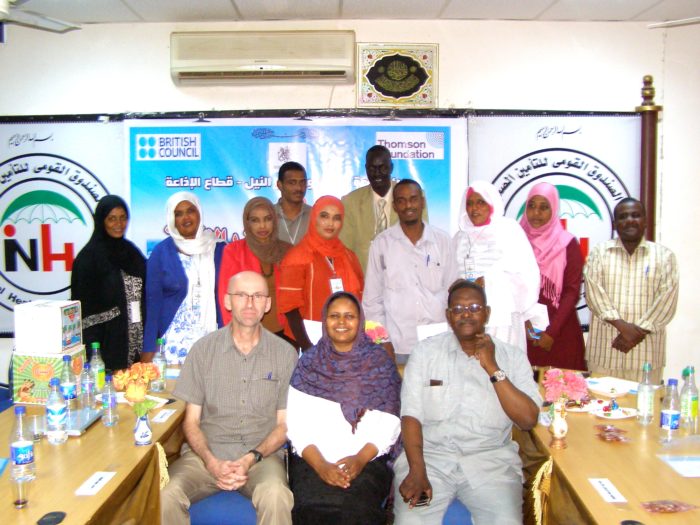
By way of quick introduction, I’m proud to be a trainer as part of the British Embassy’s media capacity building project which has run for over 3 years and trained hundreds of Sudanese journalists in print, radio and TV skills and also offered them English language courses. The project is delivered by the Thomson Foundation and the British Council.
My specialty field is radio. After more than 25 years with BBC radio, specialising in news and current affairs, I’m now a trainer with the Thomson Foundation and BBC Media Action. my aim is to understand the needs of trainees and their employers, and to deliver courses which bring about change while motivating and empowering people.
My blog below is a series of reflections on my time as a trainer in Sudan. I hope you enjoy it!
ONE WOMAN’S SUCCESS STORY
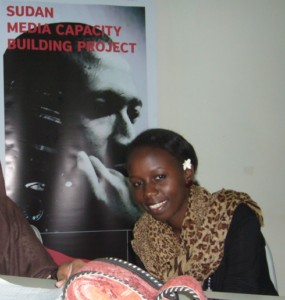
July 2016: Three years ago, Huda Mohamed was one of the first people selected for the UK-backed Media Project in Sudan. Our aim was to help individuals to develop their skills and confidence, and to make a difference to their country. So I was proud this week to learn that Huda had won a scholarship to the University of Chicago as part of the Fulbright Program.
The chance to study abroad is highly prized in Sudan, but unlike many, Huda doesn’t want to emigrate. She sees her future in using education and communication to help women, young people, IDPs and others build better lives back in her own country. Many people in Africa shrug their shoulders and wonder how they can bring about change. People like Huda just get on with it. It’s a great example and I’m sure she will be a big success.
IMPORTANCE OF RADIO
The spread of news and accurate information is held back in Africa by lack of trained radio staff. Relying on foreign “experts” isn’t a long-term answer. African solutions to African problems are what’s needed, and that’s why the UK and other countries put resources into developing the quality and scope of media education. On the ground, that means finding experienced people with passion and talent – and helping them become the next generation of trainers.
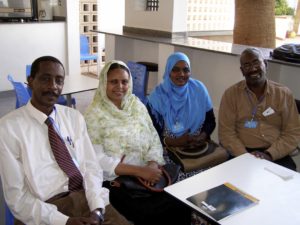
In Khartoum this week Khalil, Ikhlas and Abdelrahim have made a breakthrough by designing and delivering their first one-day course to younger colleagues. Being nervous motivated them to prepare well. But confidence rose as the day went on, and useful sessions on news reporting, sports journalism and interactive programmes were delivered with style. The trainees were happy too.
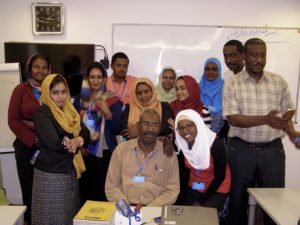
This is a hard job, and the way to learn is to do it, even if that means making the odd mistake. Days like this are what makes it all worthwhile.
SPREADING THE WORD
February 2016: Meet Entisar and Nuha. They’re experienced, educated journalists. Now they’ve discovered that they have a talent for helping others learn.
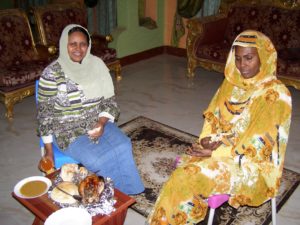
This picture was taken in a dingy flat in Gedaref in southern Sudan. It’s a tough place to work and the facilities weren’t great. But the training delivered by Entisar and Nuha was a breath of fresh air to colleagues working in the radio station in this important city. These women can deliver learning which no foreigner can match. Training of trainers is perhaps the most important thing I do.
IN THE HEART OF AFRICA
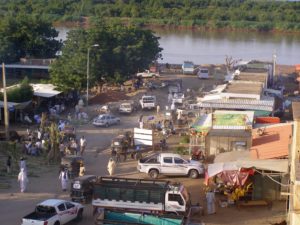
Sinja, Sudan, October 2015: A hot, dusty town on the banks of the Blue Nile where wealth is measured in cattle, and drivers swerve to avoid monkeys running across the road. The pace of life is slow, but inside the training room something unusual is happening. Not only are most of the class getting the first formal training of their careers – but it’s being led by Sudanese colleagues. I’ve spent months helping Entisar Omer and Abdelwhab Salih with the many skills needed to teach a style of journalism rather new to Sudan. Now they’re in charge of designing and delivering the course. They’re persuading the participants to widen the news agenda beyond press releases from officials. They’re showing them how to make interactive radio which actually gives listeners a voice. And to remember that impartiality and accuracy are red lines for professional journalists.
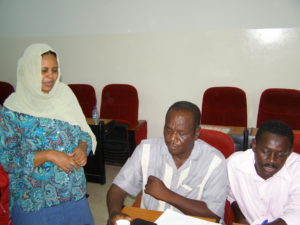
Fast forward a week to Al Obeid, a major city in North Kordofan, also in southern Sudan. Now Entisar’s been joined by Yasir Bashir, the highly respected director of youth and sports programmes at Radio Sudan. They’ve sprung some surprises – such as a game in which people “describe” events and landscapes through sound only – showing listeners what’s happening in their country without pictures or words. It’s a key radio skill, as is the ability to seek out and interrogate multiple sources of news, which trainees practice by role-playing.
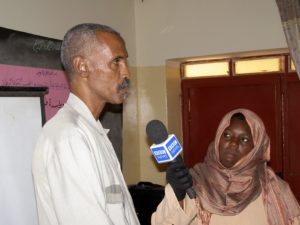
Entisar, Abdelwhab and Yasir understand the country better than a foreign trainer and can deliver the lessons in Arabic. The trainees are surprised that they’re having fun while learning, rather than listening to dull lectures. For once my job is to sit and listen – reflecting that if you pick out people with a passion to help others, and give them the tools, they can make a real difference to the media in this country.
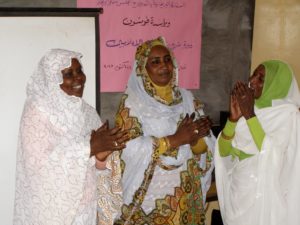
JOBS, WEDDINGS AND TRAFFIC JAMS
Khartoum, Sudan, August 2015: I often work in monolithic state broadcasting corporations – where things are slow to change and listening to listeners isn’t really a priority. That’s why it was refreshing to visit Hala FM, a new independent radio station in downtown Khartoum. Hala feels young and upbeat – and it likes to ask listeners what they want to talk about.
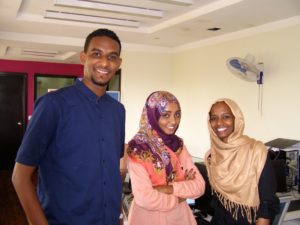
Obay, Nidal and Fatima are some of the voices you’ll hear. Lots of young people listen – and in a conservative society where respect for one’s elders is ingrained, they might feel their voices aren’t being heard. The best way to find out what’s on their minds is to ask – and greater interaction by SMS and Whatsapp suggests that the team is getting it right.
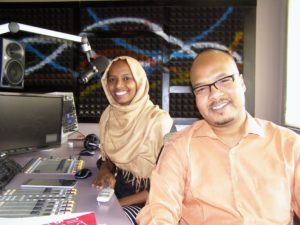
Hala’s Programme Director, Mahmoud Algaily, has come to the studio to talk to host Fatima Eltigany about what’s on the afternoon show. Fatima says the youth of the city want to talk about work (how can I find a part time job?) – weddings (how should I find a partner? Is it best to marry young or leave it for a while?) – and the thing which makes everyone grumble – traffic. The Sudanese capital is almost gridlocked in places during the afternoon rush hour, which is bad news for students, workers, people in business, in fact for almost everyone. So in the absence of up-to-date traffic news from the authorities, Fatima has recruited listeners to be the station’s eyes and ears. They get in touch to alert everyone else to problems – and the information is relayed on air right away.
UNDER PRESSURE
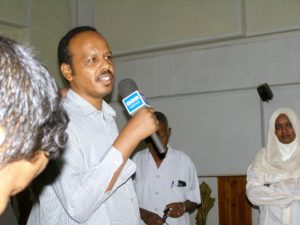
Storytelling is at the heart of my work. Whether it’s hard news or an entertainment slot, you won’t be good on air unless you can grab and keep listeners. Here’s a very experienced reporter, Mohamed, under pressure: his task, to tell an original two-minute story in Arabic with a beginning, middle and end. Everyone else in the room was asked to stand – and sit down immediately if Mohamed lost their attention. This is how audiences act – if they don’t want to hear any more, they turn off.
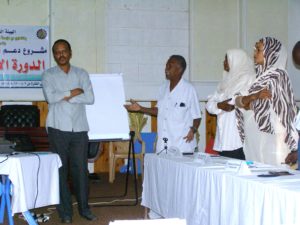
Two minutes later, everyone was still on their feet. Mohamed’s story was about people who post pictures of road accidents on social media before helping the victims. It led to a debate about a changing society. The feedback: all good.
Fail to tell a good story – lose your listeners. Simple.
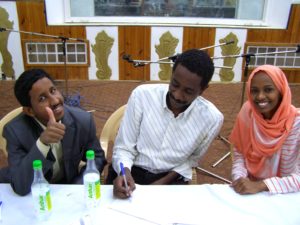
LIFE AND DEATH ISSUES
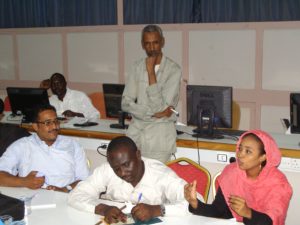
A passionate discussion with one of the news editors at Radio Sudan in Omdurman. “We must talk about reporting conflict”, Nuha tells me – explaining that the role and responsibilities of journalists in a place like Sudan are something everyone must work on.
She’s right. Her country became a lot smaller in 2011 when part of it broke away to become the new state of South Sudan. That hasn’t brought about a lasting peace – it’s a tragic story which presents huge challenges for journalists.
So I asked Nuha to make her own presentation about conflict reporting and to lead a discussion as part of our Thomson Foundation training programme. She raised many important questions: is our job to “promote peace & reconciliation” – or to report what we see and believe to be the truth?
Journalists are citizens too – what if we cover an event which may contribute to mistrust or even the breakdown of peace initiatives? Should reporters agree to be embedded with the armed forces of either side in return for good access?
There are also practical problems – like working in a danger zone. I was told about a situation when reporters wanted to go to the front line with an army convoy – the soldiers advised that it was dangerous, but the journalists went ahead in pursuit of the story and were killed.
And how about getting to the truth in a country with so many languages and dialects? When the same word in one dialect means something else in another? How will that affect the accuracy and reliability of a news report?This underlines the reporter’s responsibility to understand the exact situation, and to be accurate in the use of language.
Howdy! I know thos is kinda off topic however , I’d figured I’d ask.
Would you be interested in trading links orr maybe guest authoring
a blog article oor vice-versa? My log discusses a lot of
the same subhjects as yours and I feel we could greatly benefit from
each other. If yoou happen to be interested feel free to shnoot mee aan email.
I look forward to hearing from you! Excellent blog by the
way!
Hi, Derek Ivens am so proud to be one of the Sudanese journalists that developed their ways of writing for Radio, TV, print, and internet.
I would like to say thank you for what you have done, and am waiting to have more chance to update my writing skills